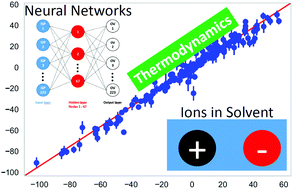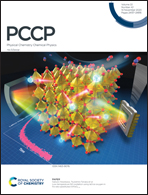Artificial neural networks for the prediction of solvation energies based on experimental and computational data†
Abstract
The knowledge of thermodynamic properties for novel electrolyte formulations is of fundamental interest for industrial applications as well as academic research. Herewith, we present an artificial neural networks (ANN) approach for the prediction of solvation energies and entropies for distinct ion pairs in various protic and aprotic solvents. The considered feed-forward ANN is trained either by experimental data or computational results from conceptual density functional theory calculations. The proposed concept of mapping computed values to experimental data lowers the amount of time-consuming and costly experiments and helps to overcome certain limitations. Our findings reveal high correlation coefficients between predicted and experimental values which demonstrate the validity of our approach.

- This article is part of the themed collection: Emerging AI Approaches in Physical Chemistry


 Please wait while we load your content...
Please wait while we load your content...